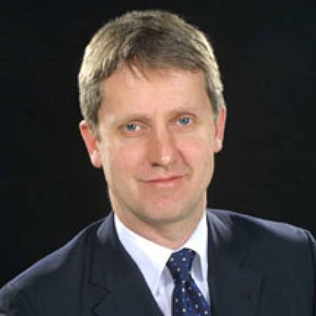Related Research Articles
Geraint Ellis Rees is Vice-Provost of research, innovation & global engagement at University College London (UCL). Previously he served as Dean of the UCL Faculty of Life Sciences, UCL Pro-Provost, Pro-Vice-Provost (AI) and a Professor of Cognitive Neurology at University College London. He is also a Director of UCL Business and a trustee of the Guarantors of Brain.

Stanislas Dehaene is a French author and cognitive neuroscientist whose research centers on a number of topics, including numerical cognition, the neural basis of reading and the neural correlates of consciousness. As of 2017, he is a professor at the Collège de France and, since 1989, the director of INSERM Unit 562, "Cognitive Neuroimaging".

Jonathon Stevens "Jon Driver" was a psychologist and neuroscientist. He was a leading figure in the study of perception, selective attention and multisensory integration in the normal and damaged human brain.
Bryan Thomas Grenfell is a British population biologist and the Kathryn Briger and Sarah Fenton Professor of Ecology and Evolutionary Biology and Public Affairs at the Princeton School of Public and International Affairs at Princeton University.

Melvyn Alan Goodale FRSC, FRS is a Canadian neuroscientist. He was the founding Director of the Brain and Mind Institute at the University of Western Ontario where he holds the Canada Research Chair in Visual Neuroscience. He holds appointments in the Departments of Psychology, Physiology & Pharmacology, and Ophthalmology at Western. Goodale's research focuses on the neural substrates of visual perception and visuomotor control.

Eleanor Anne Maguire is an Irish neuroscientist. Since 2007, she has been Professor of Cognitive Neuroscience at University College London where she is also a Wellcome Trust Principal Research Fellow.

Sarah-Jayne Blakemore is Professor of Psychology and Cognitive Neuroscience at the University of Cambridge and co-director of the Wellcome Trust PhD Programme Neuroscience at University College London.

Dorothy Vera Margaret Bishop is a British psychologist specialising in developmental disorders specifically, developmental language impairments. She is Professor of Developmental Neuropsychology and Wellcome Trust Principal Research Fellow in the Department of Experimental Psychology at the University of Oxford, where she has been since 1998. Bishop is Principal Investigator for the Oxford Study of Children's Communication Impairments (OSCCI). She is a supernumary fellow of St John's College, Oxford.

Sophie Kerttu Scott is a British neuroscientist and Wellcome Trust Senior Fellow at University College London (UCL). Her research investigates the cognitive neuroscience of voices, speech and laughter particularly speech perception, speech production, vocal emotions and human communication. She also serves as director of UCL's Institute of Cognitive Neuroscience.

Dimitri Michael Kullmann is a professor of neurology at the UCL Institute of Neurology, University College London (UCL), and leads the synaptopathies initiative funded by the Wellcome Trust. Kullmann is a member of the Queen Square Institute of Neurology Department of Clinical and Experimental Epilepsy and a consultant neurologist at the National Hospital for Neurology and Neurosurgery.

Robin Angus Silver is Professor of Neuroscience and a Wellcome Trust Principal Research Fellow at University College London. His laboratory studies neurotransmission and artificial neural networks by combining in vitro and in vivo experimental approaches with quantitative analysis and computational models developed in silico.

Neil Burgess is a British neuroscientist. He has been a professor of cognitive neuroscience at University College London since 2004 and a Wellcome Trust Principal Research Fellow since 2011. He has made important contributions to understanding memory and spatial cognition by developing computational models relating behaviour to activity in biological neural networks.
Richard Edward Passingham is a British neuroscientist. He is an international authority on the frontal lobe mechanisms for decision making and executive control. He is amongst the most highly cited neuroscientists.

Andrew John King is a Professor of Neurophysiology and Wellcome Trust Principal Research Fellow in the Department of Physiology, Anatomy and Genetics at the University of Oxford and a Fellow of Merton College, Oxford.
Social cognitive neuroscience is the scientific study of the biological processes underpinning social cognition. Specifically, it uses the tools of neuroscience to study "the mental mechanisms that create, frame, regulate, and respond to our experience of the social world". Social cognitive neuroscience uses the epistemological foundations of cognitive neuroscience, and is closely related to social neuroscience. Social cognitive neuroscience employs human neuroimaging, typically using functional magnetic resonance imaging (fMRI). Human brain stimulation techniques such as transcranial magnetic stimulation and transcranial direct-current stimulation are also used. In nonhuman animals, direct electrophysiological recordings and electrical stimulation of single cells and neuronal populations are utilized for investigating lower-level social cognitive processes.

Irene Mary Carmel Tracey is Vice-Chancellor of the University of Oxford and former Warden of Merton College, Oxford. She is also Professor of Anaesthetic Neuroscience in the Nuffield Department of Clinical Neurosciences and formerly Pro-Vice-Chancellor at the University of Oxford. She is a co-founder of the Oxford Centre for Functional Magnetic Resonance Imaging of the Brain (FMRIB), now the Wellcome Centre for Integrative Neuroimaging. Her team’s research is focused on the neuroscience of pain, specifically pain perception and analgesia as well as how anaesthetics produce altered states of consciousness. Her team uses multidisciplinary approaches including neuroimaging.
Kathryn Emma Watkins is an experimental psychologist in the Wellcome Trust centre for integrative neuroimaging at the University of Oxford and a tutorial fellow at St Anne's College, Oxford. Her research investigates the brain processes that underlie speech, language and development.
Heidi Johansen-Berg is a Professor of Cognitive Neuroscience and Director of the Wellcome Centre for Integrative Neuroimaging at the University of Oxford. She studies brain plasticity in the context of stroke rehabilitation and aging.
Catherine J. "Cathy" Price is a British neuroscientist and academic. She is a professor of cognitive neuroscience and director of the Wellcome Trust Centre for Neuroimaging at University College London.
Matthew Edward Hurles is director of the Wellcome Sanger Institute and an honorary professor of Human Genetics and Genomics at the University of Cambridge.
References
- ↑ Matthew Rushworth publications indexed by Google Scholar
- 1 2 3 4 5 6 7 Anon (2019). "Professor Matthew Rushworth FRS". royalsociety.org. London: Royal Society. Archived from the original on 2019-10-26. One or more of the preceding sentences incorporates text from the royalsociety.org website where:
“All text published under the heading 'Biography' on Fellow profile pages is available under Creative Commons Attribution 4.0 International License.” --Royal Society Terms, conditions and policies at the Wayback Machine (archived 2016-11-11)
- ↑ Anon (2015). "A Conversation with Matthew Rushworth". Cold Spring Harbor Symposia on Quantitative Biology. 79: 288–290. doi: 10.1101/sqb.2014.79.15 . ISSN 0091-7451. PMID 26092899.
- ↑ Matthew Rushworth publications indexed by the Scopus bibliographic database. (subscription required)
- ↑ Matthew Rushworth publications from Europe PubMed Central
- ↑ Rushworth, Matthew F. S. (1994). The parietal cortex and apraxia. ox.ac.uk (DPhil thesis). University of Oxford. OCLC 60390040.
- ↑ Behrens, T.E.J.; Berg, H. Johansen; Jbabdi, S.; Rushworth, M.F.S.; Woolrich, M.W. (2007). "Probabilistic diffusion tractography with multiple fibre orientations: What can we gain?". NeuroImage. 34 (1): 144–155. doi:10.1016/j.neuroimage.2006.09.018. ISSN 1053-8119. PMC 7116582 . PMID 17070705.

- ↑ Behrens, Timothy E J; Woolrich, Mark W; Walton, Mark E; Rushworth, Matthew F S (2007). "Learning the value of information in an uncertain world". Nature Neuroscience. 10 (9): 1214–1221. doi:10.1038/nn1954. ISSN 1097-6256. PMID 17676057. S2CID 18051225.
